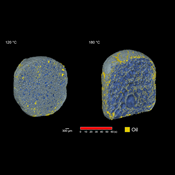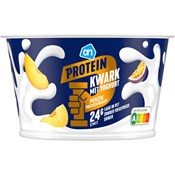


Sourdough has its advantages. "With the right choice of flour and water, bakers can control the taste and texture of the sourdough bread themselves," says Caroline Vanderbauwede of Dossche Mills. "Dossche Mills supports artisanal bakers by offering personal demos and getting them started with sourdough themselves."
Sourdough bread is not leavened with yeast, but with a sourdough starter. The sourdough starter contains a variety of lactic acid bacterial cultures, so the dough takes longer to rise, improving quality. Quality takes time. "Of course, the right blend of flours also affects the taste of the bread," says Dossche Mills marketing manager Caroline Vanderbauwede. "Dossche Mills is among the leading producers and suppliers of bakery ingredients. As well as selling our products to craft bakeries, we also supply the pastry and food sector and industrial bakeries."
Acidic? No!
A sourdough starter is not sour or acidic. That’s a misunderstanding. In most countries, the name for sourdough usually has nothing to do with acidity. In French sourdough is called ‘levain’, meaning leaven. In Spanish it is ‘massa madre’, which translates as ‘mother culture’. In Italy they refer to ‘lievito naturale’ or natural yeast. German does indeed call it ‘sauerteich’, or sourdough.

Healthier
A number of studies show that fermenting yeasts and lactic acid bacteria have beneficial health effects, depending on the micro-organisms and the type of flour and grain. Substances such as phenols, sterols, vitamins, minerals, dietary fibre, fats, proteins, bioactive peptides and starches are better absorbed into the body through the gut (source: Brood & Gezondheid). Sourdough bread also has a low glycaemic index. This means that after you have eaten, the energy is released to your body over a longer period of time, so you feel full for longer. This can only be good for your health.

Certain sourdough cultures can partially break down gluten and other proteins. This can be beneficial for people who are gluten-sensitive. The extent to which this occurs seems to depend on protease activity, an enzyme naturally present in flour that breaks down proteins. The length of fermentation and the choice of lactic acid bacteria strains affect acidity and protease activity and hence the ability to break down proteins (source: Brood & Gezondheid).

“It is always advisable to maintain a critical perspective on your own products and adjust them to contemporary needs where necessary”, emphasises Marijke Adriaens, CEO of frozen food company Fribona. “For consumers, taste is still the main consideration. It is essential to work towards a product that is, above all, tasty and visually appealing.”...

Scientists from KU Leuven have discovered how oil penetrates snacks during and after the frying process. Recent research findings point to advanced frying techniques that reduce oil absorption, as well as innovative methods to limit oil uptake during the cooling phase. This paves the way for the development of healthier snacks without compromising...

Food companies are increasingly targeting a wider range of consumer groups. Speaking at an event organised by Fenavian, Julian Mellentin of New Nutrition Business said this strategy offers significant opportunities to respond to the diverse health needs and interests of today’s consumers. “Consumers enjoy both animal and plant-based proteins”, he...

Backed by financial partners, Start it @KBC is launching the accelerator programme Scale it Agro, aimed at scale-ups offering sustainable and innovative agricultural solutions for agriculture and horticulture businesses. Kjell Clarysse, programme director at Scale it Agro, goes into more detail.